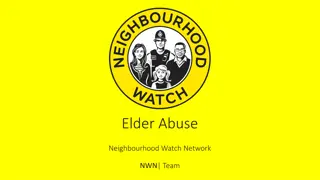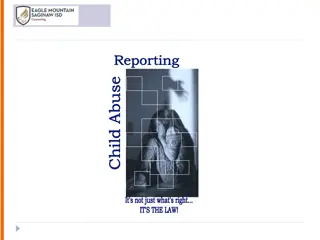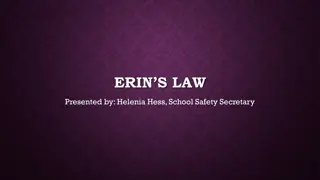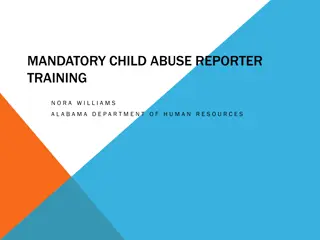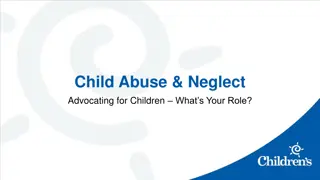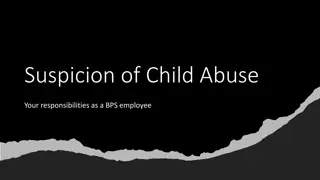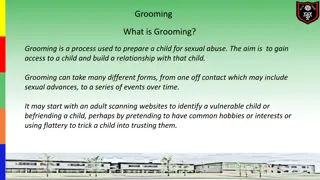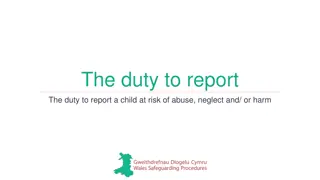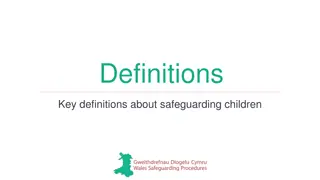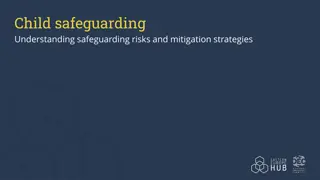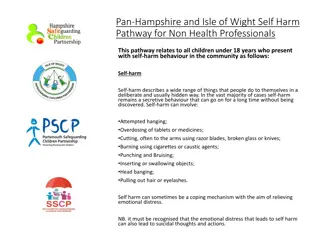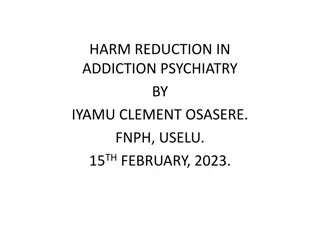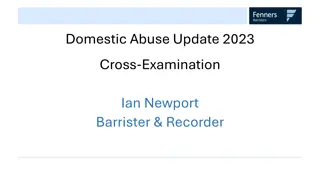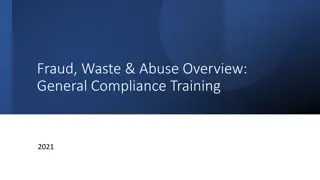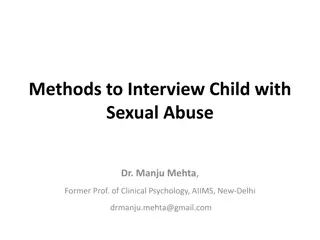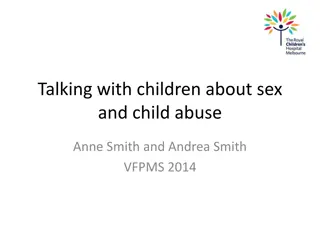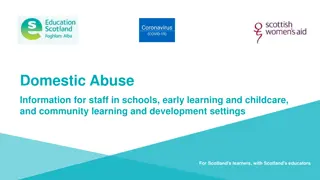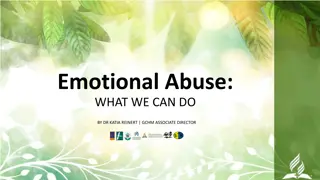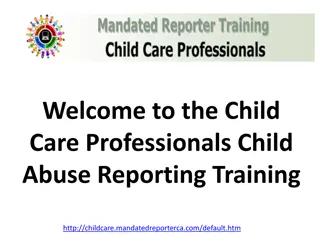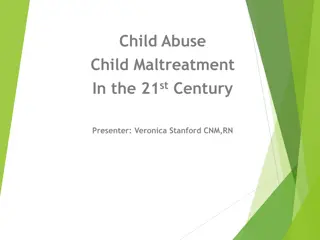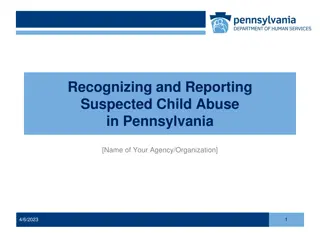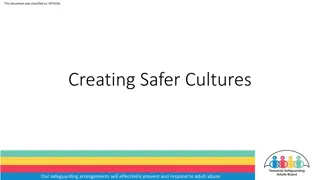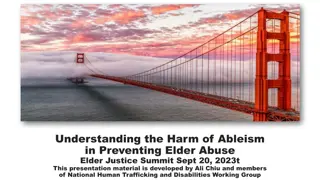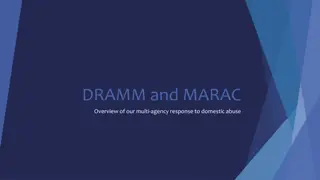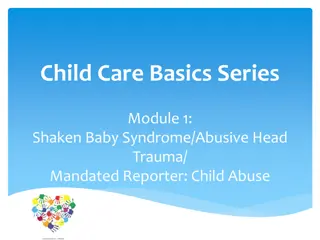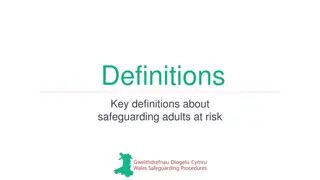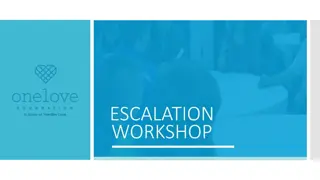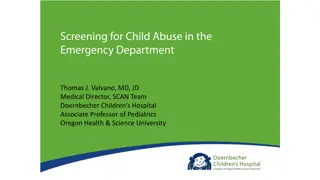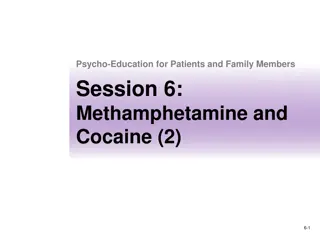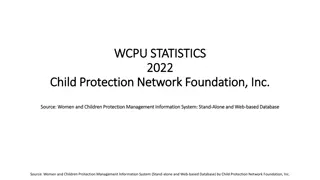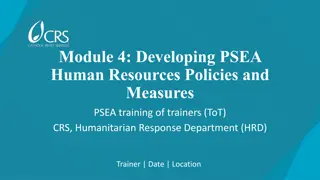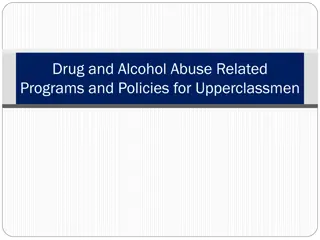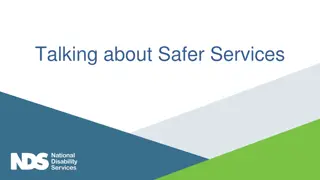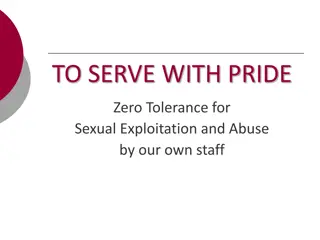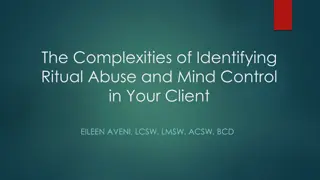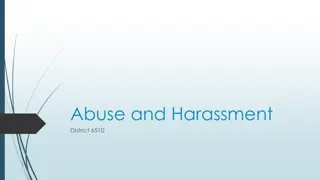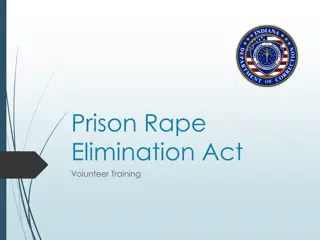Recognizing Signs of Child Abuse and Preventing Harm
Children often exhibit signs of abuse through changes in behavior, and it is important for adults to be vigilant and proactive in identifying and addressing these signs. This includes watching for inappropriate behaviors, nightmares, withdrawal, secretive behavior, sudden personality changes, and more. Adults must also be aware of signs that an adult may be using their relationship with a child for sexual reasons. Being knowledgeable about these signs can help protect children and prevent harm.
Download Presentation

Please find below an Image/Link to download the presentation.
The content on the website is provided AS IS for your information and personal use only. It may not be sold, licensed, or shared on other websites without obtaining consent from the author. Download presentation by click this link. If you encounter any issues during the download, it is possible that the publisher has removed the file from their server.
E N D
Presentation Transcript
Upstream PART 4: How to prevent it
1 SIGNS OF ABUSE Children often show us rather than tell us that something is upsetting them. There may be many reasons for changes in their behaviour, but if we notice a combination of worrying signs it may be time to call for help or advice. What to watch out for in children: Acting out in an inappropriate sexual way with toys or objects Nightmares, sleeping problems Becoming withdrawn or very clingy Becoming unusually secretive Sudden unexplained personality changes, insecurity or mood swings Regressing to younger behaviours, e.g. bedwetting Unaccountable fear of particular places or people Outburst of anger Changes in eating habits New adult words for body parts and no obvious source Talk of a new, older friend and unexplained money or gifts Running away Self-harm (cutting, burning or other harmful activities) Physical signs*, such as, unexplained soreness or bruises around genitals or mouth, sexually transmitted diseases, pregnancy Not wanting to be alone with a particular child or young person Any one sign doesn't mean that a child was or is being sexually abused, but the presence of several suggests that you should begin to ask questions and consider seeking help. Keep in mind that some of these signs can emerge at other times of stress such as divorce, bereavement or other traumatic events. *Note: Physical signs of sexual abuse are rare, however, if you see these signs, take your child to a doctor. Your doctor can help you understand what may be happening and test for sexually transmitted diseases.
1 SIGNS OF ABUSE Signs that an adult may be using their relationship with a child for sexual reasons The signs that an adult is using their relationship with a child for sexual reasons may not be obvious. We may feel uncomfortable about the way they play with the child, or seem always to be favouring them and creating reasons for them to be alone. There may be cause for concern about the behaviour of an adult or young person if they: Refuse to allow a child sufficient privacy or to make their own decisions on personal matters Insist on physical affection such as kissing, hugging or wrestling even when the child clearly does not want it Are overly interested in the sexual development of a child or teenager Insist on time alone with a child with no interruptions Spend most of their spare time with children (little interest in spending time with people their own age) Regularly offer to baby-sit children for free or take children on overnight outings alone Buy children expensive gifts or give them money for no apparent reason. Frequently walk in on children/teenagers in the bathroom. Treat a particular child as a favourite, making them feel 'special' compared with others in the family. Pick on a particular child.
1 SIGNS OF ABUSE Child abuse among children and young people We all know that children pass through different stages of development as they grow, and that their awareness and curiosity about sexual matters change as they pass from infancy into childhood and then through puberty to adolescence. Each child is an individual and will develop in his or her own way. However, there is a generally accepted range of behaviours linked to a child s age and developmental stage. Sometimes these will involve some exploration with other children of a similar age. It can be difficult to tell the difference between age appropriate sexual exploration and warning signs of harmful behaviour. Occasionally we may need to explain to children why we would prefer them not to continue with a particular behaviour. This is a chance to talk with them about keeping themselves and others safe and to let them know that you are someone who will listen. Disabled children may develop at different rates, depending on the nature of their disability, and they can be more vulnerable to abuse. Children with learning disabilities, for example, may behave sexually in ways that are out of step with their age. Particular care may be needed in educating such children to understand their sexual development and to ensure that they can communicate effectively about any worries they have. It is important to recognise that while people from different backgrounds have different expectations about what is acceptable behaviour in children, sexual abuse happens across all races and cultures. Remember that each child develops at his or her own pace and not every child will show the behaviours described below. If you have any worries or questions about a child you know, talk to someone about it. Your health visitor, GP or child s teacher may be able to help, or you could ring the Stop it Now! Helpline.
1 SIGNS OF ABUSE Age-Appropriate Sexual Behaviour Age Commonly Rarely Pre-school children (0-5 years) Use childish sexual language to talk about bodies Ask how babies are made and where they come from Touch or rub their own genitals Show and look at private parts Discuss sexual acts or use sexually explicit language Have physical sexual contact with other children Show adult-like sexual behaviour or knowledge School-age children (6-12 years) Ask questions about menstruation, pregnancy and other sexual behaviour Experiment with other children, often during games, kissing, touching, showing and role playing e.g. mums and dads or doctors and nurses Masturbate in private Masturbate in public Show adult like sexual behaviour or knowledge Adolescents Ask questions about relationships and sex Use sexual language and talk between themselves about sexual acts Masturbate in private Experiment sexually with adolescents of similar age NB. About one-third of adolescents have sexual intercourse before the age of 16. Masturbate in public Have sexual contact with much younger children or adults
1 SIGNS OF ABUSE Warning signs of sexually harmful behaviour One of the hardest things for parents to discover is that their child may have sexually harmed or abused another child. In this situation, denial, shock and anger are normal reactions. If it is not responded to quickly and sensitively, the effect on the whole family can be devastating. For this reason it is vital to contact someone for advice about what to do as soon as you suspect that something is wrong. Early help for the child or young person and their family can prevent them moving on to more serious behaviour. It is important to be alert to the early warning signs that something is going wrong. If you know a child or adolescent who is exhibiting the following behaviour, you should talk to the child or young person and seek advice. Seeks out the company of younger children and spends an unusual amount of time in their company Tells you they do not want to be alone with a child or becomes anxious when a particular child comes to visit Shares alcohol or drugs with younger children or teens Views child pornography on the internet or elsewhere Takes younger children to secret places or plays special games with them (e.g. doctor and patient, removing clothing) Frequently uses aggressive or sexual language about adults or children Exposes his / her genitals to younger kids Shows sexual material to younger kids Forces sex on another adolescent or child Insists on hugging or kissing a child when the child does not want to Makes sexually abusive phone calls
1 SIGNS OF ABUSE What you can do if you see warning signs Create a family safety plan we will show you how in the next section. Don t wait for proof of child sexual abuse. If you are concerned about the sexualized behaviours in a parent, cousin, sibling, friend, or neighbour, you should consider contacting the police or children's services in your area, they can take action if appropriate. If you choose not to do that, care enough to talk to the person whose behaviour is worrying you. Make sure everyone knows that it s OK to talk with you about what may have already happened that you love them and will help them. For additional resources or for advice on developing your Family Safety Plan, call our Helpline on 0808 1000 900.
2 SMART RULES FOR PARENTS Talking to and listening to your child is the best prevention against child sexual abuse Too often, child abuse continues because children are coerced into keeping problems a secret. A simple rule the whole family can follow is: Problems should not be secret S Secrecy Parents may believe their child would tell them if they were being abused, but statistics suggest that this often not the case. Pay attention to warning signs don t assume your child will tell you M Monitor Bringing up a child is not a lone endeavour, and we frequently have to trust others with our children. However, this trust doesn t have to be unconditional don t ignore any feelings of unease A Attention When it comes to their body and personal boundaries, respect your child s wishes by understanding their views, and not forcing them to do things they don t need to do R Respect Keeping safe is a very important topic. Give it the focus it deserves, by talking openly and regularly to your children; learn to be a great listener and keep the conversation going T Talk
2 SMART RULES FOR PARENTS Too often, child abuse continues because children are coerced into keeping problems a secret. A simple rule the whole family can follow is: Problems should not be secret S Secrecy The following tips are recommended by the child safety organisation Kidpower: 1. As soon as children are old enough to understand, teach them about safe secrets and unsafe secrets Safe secrets include: Surprise parties or gifts; Gossip and games where no-one is hurt or left out. Unsafe secrets include: Any kind of touch; Presents (or favours) from other people; Anything that bothers you 2. Don t allow or expect young children to keep any kind of secrets Under 5 s are best off having a clear no secrets rule. They are unlikely to understand about safe and unsafe secrets, or about not repeating things they have heard. Avoid saying things around very young children that you do not wish to be repeated. 3. When they can understand, teach children about privacy and confidentiality As they mature, children can understand that there are times to respect the privacy of others by not discussing everything in public. You can use daily events to help define the rules. 4. When privacy about a problem is important, make sure your child is still supported For example, if there is a serious illness in the family, make sure that children have several adults who they can confide in and find ways they can say something to their friends 5. Secrets, privacy, and confidentiality are complex issues, so look for opportunities to keep the discussion going
2 SMART RULES FOR PARENTS Parents may believe their child would tell them if they were being abused, but statistics suggest that this often not the case. Pay attention to warning signs don t assume your child will tell you M Monitor 1. Get to know your child really well Children can be mysterious, and as they grow, they are constantly changing. Spend plenty of one-on-one time with them on a regular basis. Ask lots of open-ended questions and pay attention to subtle cues like their body language. 2. Be aware of signs that your child might be unhappy Children can be very emotionally expressive, and sadness or fear are normal emotions, which can come and go. However, if your child is persistently unhappy then this is worth trying to understand. Some behavioural signs might include: Withdrawing from friends or feeling lonely Low self esteem - feeling hopeless or worthless Lack of energy they may feel tired often Sleeping more or having difficulty falling asleep Reduced interest in activities they enjoyed Feeling restless or irritable Low mood not laughing much or expressing joy Grades slipping at school Change in appetite 3. Be alert to the warning signs of abuse As listed previously, these can include: acting out in a sexual way, sudden unexplained personality changes, mood swings and seeming insecure, unaccountable fear of particular places or people or physical signs (injuries, STDs, pregnancy) Note that these signs do not necessarily mean your child has been abused indeed the trigger could be another stressful experience, like bullying, bereavement or a divorce, or there may be no obvious cause. However, it is always worth a conversation.
2 SMART RULES FOR PARENTS Bringing up a child is not a lone endeavour, and we frequently have to trust others with our children. However, this trust doesn t have to be unconditional don t ignore any feelings of unease A Attention 1. Children s safety comes first Making a decision for the safety of a child is more important than anybody s feelings about that decision. If you suspect that a child is at risk, it is your responsibility to act. You do not need to wait for proof of abuse, before taking steps to protect children. 2. Trust does not need to be unconditional Most people can be trusted and many will have demonstrated their trustworthiness to you over years or decades. However, it is also true that some sexual predators will deliberately create opportunities to abuse children, by putting themselves in positions of trust. You do not have to trust people just because of their job title or because they seem nice. Trust your intuition if something feels uncomfortable to you. Similarly, get to know who your child is friends with, as children and young people are also capable of abuse. 3. Know the warning signs of abuse Be alert to warning signs, such as adults or older children who show particular attention to your child, or seek to be alone with them. If you ask a person to stop a certain behaviour, and they persist particularly through the use of deception, threats, or manipulation then this is a further sign that the person may not be safe. 4. Beware of the power of denial As well as grooming their child victim, the abuser may also have made specific efforts to build trust in adults as well including you. If the abuser is someone we like or care about, the pain of this betrayal may make it very difficult for us to act in the way we rationally know is best. Recognise that what feels safe and comfortable for you may not be in the best interests of your child.
2 SMART RULES FOR PARENTS When it comes to their body and personal boundaries, respect your child s wishes by understanding their views, and not forcing them to do things they don t need to do R Respect 1. Teach your child that their body belongs to them For younger children, the NSPCC s underpants rule is easy to understand: Your private areas are the parts of your body that can be covered by your underpants. Other people should not touch your private areas, and they should not ask you to touch their private areas. For older children and adolescents, make sure they have a good understanding of internet safety, sexual consent and coercion, so that they can protect themselves and avoid harming others. 2. Teach them about choices Children will often want things that are not what we would choose for them. Indeed, sometimes we cannot or should not give them a choice when what they want is simply not safe, reasonable or physically possible. For example, they may need to learn that a painful medical treatment is for their safety, and therefore not a choice. However, most decisions do involve an element of choice. Take the opportunity to each your child that they have a choice, that they can express their wishes, and that they will be heard. 3. Compliance is not the end goal Your child will eventually grow into an adult who will need to navigate the world independently. Offering your child choice and autonomy may not always feel like an easy option, but teaching your child to always obey adults without question can also make them more vulnerable to abuse.
2 SMART RULES FOR PARENTS Keeping safe is a very important topic. Give it the focus it deserves, by talking openly and regularly to your children; learn to be a great listener and keep the conversation going T Talk 1. Listen, don t lecture If your child is not opening up as much as you would like, try asking more open ended questions and leaving long pauses for them to respond. If they find a topic difficult, try to understand why. 2. Remember it s an ongoing conversation We often refer to it as the The Talk but teaching children about sex is too complex for a single conversation. It is important that kids not only understand the scientific facts about their bodies and sexual behaviour, but are also equipped to deal with interpersonal relationships and personal safety. Seek opportunities in everyday life to discuss, and break The Talk into easily digestible chunks. 3. Make the experience as positive as you can When talking about sex or personal safety, your child may confide something that is hard for you to hear. Try to listen calmly and be reassuring. If you sense that this will be too difficult for you (if you experienced abuse yourself, or if you have strongly-held views) then don t be afraid to seek support for example, another trusted adult to join the conversation or talk to afterwards. 4. If you get it wrong, be willing to try again Conversations may not always go as planned maybe you struggled to answer an unexpected question or you reacted badly to something your child told you. If this happens, attempt the conversation again, to correct any misunderstandings and explain why you responded as you did.
3 CREATING A FAMILY SAFETY PLAN If you are concerned about keeping your child safe from sexual abuse, this is your chance to create a safer environment and a support network for everyone in your family. Youngsters are immediately safer when parents and caregivers take the time to learn about sexual abuse and its warning signs. We talk about risk factors what puts someone at risk to sexually abuse a child but we must also talk about protective factors the things a family can do to keep the family safer. Protective factors are the building blocks of your family. You can download a booklet to help you with creating a family safety plan from the Parents Protect website. Parents and caregivers who make a commitment to speak up as soon as they have a concern, instead of waiting for certain evidence of harm, play an even more crucial role in a child's safety. Here are some things that you and your family can do to protect children from sexual abuse: Know The Signs Open Lines of Communication Educate Everyone In The Family Set Clear Family Boundaries Get Safe Adults Involved Monitor Access Seek Help and Advice Be aware of warning signs of abuse in children, young people and adults Maintain an ongoing and positive dialogue about sex and relationships Encourage children and other protective adults to learn about body safety Discuss and set shared rules around body safety for the whole family Be sure that no one in your family is isolated Take sensible precautions with who has access to your children You are not alone
3 CREATING A FAMILY SAFETY PLAN Know The Signs Open Lines of Communication Educate Everyone In The Family Set Clear Family Boundaries Get Safe Adults Involved Monitor Access Seek Help and Advice Know the signs Warning sign is really just another way of saying opportunity for prevention a chance for caring adults to recognise possible risk and to take action to protect children Read more about the warning signs listed earlier in this course Remember, the most effective prevention takes place before there s a child victim to heal or an offender to punish
3 CREATING A FAMILY SAFETY PLAN Know The Signs Open Lines of Communication Educate Everyone In The Family Set Clear Family Boundaries Get Safe Adults Involved Monitor Access Seek Help and Advice Open lines of communication Whether talking with a child, adolescent, or adult, about sexualised behaviours or your concerns, the conversation is just a beginning and not a one-time event Let everyone in the family know it is OK to ask questions. It is important for adults to set the tone for everyone by talking about the range of healthy sexual behaviours and speaking up about abuse Use some of our suggested resources at the end of this course, help you start some really important conversations Make sure everyone knows that it s OK to talk with you about what may have already happened that you love them and will help them
3 CREATING A FAMILY SAFETY PLAN Know The Signs Open Lines of Communication Educate Everyone In The Family Set Clear Family Boundaries Get Safe Adults Involved Monitor Access Seek Help and Advice Educate everyone in the family Understand healthy sexual development in children as well as the sexual behaviours that may be of concern to you as a parent/carer Learn the warning signs of a child who may have been hurt by sexual abuse as well as the warning signs in an adult, adolescent or child who may be touching a child in a sexual way. Your concerns may be about non-touching behaviours as well (e.g. showing pornography to a child) Teach children the proper names for body parts and what to do if someone tries to touch them in a sexual way. Remember to let young children know that no one has the right to touch their private parts (unless for medical reasons) and that they should not touch anyone else s private parts
3 CREATING A FAMILY SAFETY PLAN Know The Signs Open Lines of Communication Educate Everyone In The Family Set Clear Family Boundaries Get Safe Adults Involved Monitor Access Seek Help and Advice Set clear family boundaries Talk about and set clear family boundaries with family members and with other adults who spend time around or supervise the children (e.g., if a child does not want to hug or kiss someone hello or goodbye then he or she can shake hands instead). If a child is not comfortable with a particular adult or older child then you or some other adult must let that person know (e.g., tell him or her that you don t want your child to sit on his/her lap). As a child matures, boundaries within the home may need to change as well (e.g., knock on the door before entering the room of an adolescent).
3 CREATING A FAMILY SAFETY PLAN Know The Signs Open Lines of Communication Educate Everyone In The Family Set Clear Family Boundaries Get Safe Adults Involved Monitor Access Seek Help and Advice Get safe adults involved Be sure that no one in your family is isolated. Identify one or more support people for every member of the family Research shows that one of the key factors in a child s resilience (ability to bounce back after stressful events) is that he/she had someone to talk with and confide in. Be a safe, responsible and consistent resource person for a child or adolescent If someone is too good to be true then ask more questions this friend or family member may not be a safe person for your child. Sadly, unconditional trust cannot protect children from harm
3 CREATING A FAMILY SAFETY PLAN Know The Signs Open Lines of Communication Educate Everyone In The Family Set Clear Family Boundaries Get Safe Adults Involved Monitor Access Seek Help and Advice Take sensible precautions with who has access to your children Be aware of who is paying attention to your children and who their friends are Don t ignore any unease you feel about people showing interest in your child If you are concerned about the sexualised behaviours in a parent, cousin, sibling, friend, or neighbour, care enough to talk with them
3 CREATING A FAMILY SAFETY PLAN Know The Signs Open Lines of Communication Educate Everyone In The Family Set Clear Family Boundaries Get Safe Adults Involved Monitor Access Seek Help and Advice Seek help and advice Know your local resources and how to access them. We have listed various resources to call/contact for advice, information and help at the end of this course. Learn about the agencies in your area. Know who to call to make a report if you learn that a child has been sexually abused. If you are concerned about your own thoughts and feelings towards children, help is available For additional resources or for advice on developing your Family Safety Plan, call our Helpline on 0808 1000 900
4 DIFFICULT CONVERSATIONS When a Child Tells About Sexual Abuse Three quarters of children who are sexually abused do not tell anyone about it and many keep their secret all their lives. The closer the relationship between the abuser and the victim, the less likely they are to talk about it. Children often show us rather than tell us that something is upsetting them so being aware of the signs is vital. However, children may give vague hints that something is happening. Their information may not be clear and they may not have the words to explain what is happening to them. The way adults respond to this is vital to ensuring the child s safety. For some children, the experience of disclosing their abuse and not receiving the support they need can be just as damaging as the abuse itself. By the same token, parents and protective adults have a huge opportunity to help the child heal from their abuse, by dealing with it effectively.
4 DIFFICULT CONVERSATIONS When a Child Tells About Sexual Abuse Respond with care and urgency If you think a child is trying to tell you about a sexually abusive situation, respond promptly and with care. The police and children's social services have joint working arrangements for responding to suspected child sexual abuse. They are experienced in this work and will deal sensitively with the child and family. Believe the child If a child trusts you enough to tell you about abuse, you must remember that they rarely lie about such things. Although it may be hard to believe that someone we trust or care about is capable of sexually abusing a child, it's highly unlikely that a child would deliberately make false accusations about adult-like sexual behaviours. The pressures on the child to keep silent are enormous. It takes tremendous courage to talk about abuse. A child's claim that sexual abuse did not happen (when it actually did), or taking back a disclosure of abuse are common. Sometimes the child's account of what happened changes or evolves over time. This is a common pattern for disclosure and should not invalidate their story. Be supportive, calm and caring It is important that they feel supported don t dismiss their claims or put them off talking about it. If they are talking to you about it, don t get angry. Stay calm and steady. If you get angry the child may think you are going to punish them this will play into the hands of the abuser who warned the child not to tell. Make sure the child knows you love them and that they have done nothing wrong and keep telling them. The child will need to see that adults believe them and they are doing all they can to protect them. Make sure the child knows they were right to talk about it and that you are glad they came to you. Face the problem When the abuse is known, adults must face the problem honestly, protect the child at all costs and place responsibility appropriately with the abuser. Re-establish safety Do what is necessary to protect the child from further harm. Put into place a family safety plan. Get help from professionals who can help guide you towards safety and healing. For more information see the end of this course. Get help Do not despair Children can and do recover from child sexual abuse. It is incredibly difficult to hear that someone you love has been hurt in such a way but help to recover is available.
4 DIFFICULT CONVERSATIONS No-one will believe me They will harm me or someone I love They will take something important from me I don t know what will happen I don t know who to trust I will be punished I thought they were safe They will say I m lying I wanted something from them I will be rejected afraid I shouldn t have been doing that I ve upset the family hopeful guilty Maybe it will stop I shouldn t have said anything What the child may be feeling Maybe I should take it back Other people can help me ashamed relieved Parts of it felt good People believe me It s not a secret anymore My body did something strange confused I couldn t stop them I don t have to see them anymore I m not in trouble I care about them I don t want them to get in trouble I m not sure what happened
4 DIFFICULT CONVERSATIONS I m worried what will happen to the person What if my child becomes an abuser? I m worried how this will affect my child I fear they will never recover What if I make this worse? They might hurt themselves I m worried what will happen to my family I fear my family won t survive this I don t know who to trust afraid The person has power over me I still care about the person who did this I didn t protect my child Nobody wants to hear lonely guilty It s my fault I m isolated What you may be feeling I didn t see what was happening Nobody understands They hurt my child angry grieving I ve lost someone I trusted They deceived me They betrayed my trust I ve lost the life I had They manipulated me confused My child and my family are not the same My child didn t tell me I m worried about them My life isn t what I thought it was I care about the person Maybe the child got it wrong They shouldn t have kept secrets
4 DIFFICULT CONVERSATIONS Intervening with the person who has sexually abused The person who has sexually abused a child needs to be held accountable and get specialized professional help. The local police or children's services are often best placed to take the next steps. Should you choose not to contact them, and if it is safe, consider speaking directly to the person who has offended. Some points to keep in mind when speaking with someone who has or may have abused: Explore the situation in a non-accusatory, non-confrontational way. This may help to reduce the person's defensiveness. Keep calm Be specific about the behaviours that concern you and state your reactions to them. Be specific Ask simple and direct questions. Ask questions Let the person know that there is help available; individuals can and have gone on to live abuse-free lives by first taking responsibility for the harm they've done, facing the consequences of their actions, and committing themselves to change and to specialized treatment. Encourage them to call the Stop it Now! Helpline on 0808 1000 900. Recommend they get help If you feel it, let the person know that you care about them. Loving support can be an important factor in getting someone to take responsibility, face consequences and get treatment. Offer love and support (if you can) Conversations generally need to happen more than once. Repeat Find an ally for yourself whom you can turn to for support. Get help for yourself
4 DIFFICULT CONVERSATIONS I fear losing things that are important to me What if I lose my family and friends? What if my family reject me? I don t know what will happen to me Am I going to go to jail? Will I be on the sex offenders register? People will hate me What if I lose my job? I m afraid of the legal consequences afraid I have done a terrible thing Maybe things will change I have let my family down hopeful remorseful Maybe someone can help I have hurt a child Maybe this can stop What they may be feeling I took advantage of trust ashamed I don t have to cope on my own relieved I want to hurt myself I don t have to lie any more I hate myself It s no longer a secret in denial They shouldn t have said anything The child enjoyed it The child wanted it The child is at fault I didn t hurt the child The child got me in trouble It didn t happen like that
4 DIFFICULT CONVERSATIONS Getting help for yourself Learning that a child has been abused is a time of trauma. It's important to get help for yourself to help you cope with the emotions, challenges and decisions you face. In particular, when a child is abused by another family member, each family member is affected. Typically, the help of outside specialists is needed to address the emotional toll on the family and to assist the healing process of each individual. When sexual abuse takes place within families, the pain we experience can include conflicting and confusing emotions. We may feel extreme anguish over what was done to the child, while still feeling love and concern for the family member who committed the abuse. For support in working through these difficult issues, call our Helpline on 0808 1000 900



